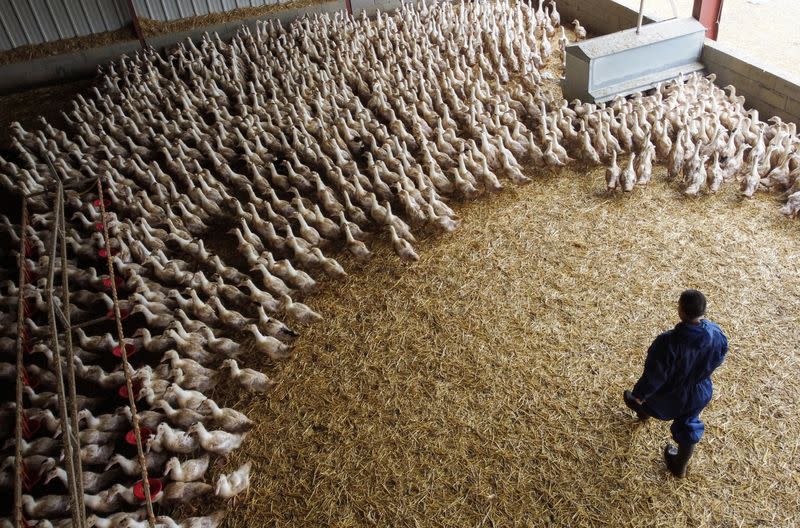Factbox-Bird flu vaccination policies by country

(Reuters) - A growing number of countries are turning to vaccinations against avian influenza, commonly known as bird flu, to stem one of the world's worst outbreaks of the deadly virus.
More than 30 countries have resorted to the use of vaccination against highly pathogenic avian influenza (HPAI) since 2005, the World Organisation for Animal Health (WOAH) said, based on the data reported by its members.
Here are some examples of countries that have started vaccinating against bird flu, are in the process of allowing farmers to do so, or are still opposed to using bird flu vaccines in poultry.
INTERNATIONAL STANDARDS
International standards drawn up by WOAH allow for vaccinations against bird flu and with no trade restrictions, if adequate surveillance of vaccinated flocks shows there is no virus in circulation.
Vaccination on its own is not sufficient and must be used as part of a comprehensive strategy, providing for preventive health measures and other disease control such as culling, movement restrictions and surveillance, WOAH said.
COUNTRIES USING POULTRY VACCINES
MEXICO - It authorised emergency vaccinations against the highly pathogenic H5N1 bird flu strain earlier this year.
The country is currently using two vaccines made by Avimex and Boheringher. By mid-February about 170 million vaccine doses had been administered by certified veterinarians.
Mexico, which has 557 million birds in its poultry industry, does not export poultry products. It has been forced to cull 5.9 million birds because of bird flu in the latest outbreak.
Other Central American countries including Guatemala, Honduras and El Salvador are also buying the bird flu vaccines used by Mexico.
Mexico also vaccinated poultry against the H5N2 strain of bird flu in 1994 and the H7N3 strain in 2012.
CHINA - It is the world's the second biggest poultry meat producer behind the United States and the world's largest egg producer, but mainly consumes its poultry products at home.
The country started vaccinating against bird flu in buffer areas of disease outbreak sites in 2004.
A low pathogenic (LPAI) strain of the H7N9 virus that first emerged in 2013 and killed more than 100 people in the winter of 2016-17 prompted a nationwide vaccination programme.
It has prevented major countrywide outbreaks for the past few years, although there are still sporadic outbreaks in small-holdings or areas where poultry hasn't been vaccinated. People working with poultry in China are also sporadically infected with different strains, sometimes fatally.
EGYPT - The North African country has been vaccinating against bird flu since 2006.
"As long as the vaccine is updated and there's an investigation and follow up of the epidemiological situation in the market, the vaccines remain effective," Abdel-Sattar Arafa, from Egypt's National Laboratory for Veterinary Quality Control on Poultry Production said.
Issues in 2007 related to the misuse of the vaccine, which could result in mutations and resistance to the shots, prompted Egypt adapt vaccines to bird flu strains found locally.
COUNTRIES OR REGIONS ON TRACK TO START VACCINATIONS
EUROPEAN UNION - The bloc's 27 member states agreed to implement a bird flu vaccine strategy in May.
They divided the research between member states, with France working on a vaccine for ducks, the Netherlands for egg-laying hens, Italy for turkeys and Hungary for Pekin ducks. The results are expected in the coming months.
Ministers also adopted draft regulations harmonising vaccination rules, which is due to come into force in March.
The new rules ensure vaccinated captive birds, vaccinated poultry sent for immediate slaughter, other poultry products and day-old chicks from vaccinated birds can be traded freely within the bloc, a European Commission spokesperson told Reuters.
FRANCE - It is the country worse hit in the European Union by bird flu this season with more than 20 million birds killed.
The government has said it was working on a vaccination strategy which will include which species to vaccinate, with which vaccine, where, and who will bear the costs.
The country is on track to start vaccinations in September.
COUNTRIES NOT USING VACCINES
UNITED STATES - The U.S. Department of Agriculture (USDA) told Reuters it does not plan to authorise vaccinations they would have detrimental impacts on poultry trade while still requiring other measures such as quarantines, culls and surveillance testing of flocks.
The USDA bought vaccines for a national veterinary stockpile following a major outbreak in 2015 but never used any of them.
U.S. researchers are testing the efficacy of a version of the vaccine from 2015 which has been updated to fight the strain of the virus currently circulating, David Suarez, acting laboratory director of the USDA's Southeast Poultry Research Laboratory in Athens, Georgia, said.
"The big question is: could you get your commercial partners to accept vaccinated poultry? The short answer to that is not yet," Suarez said
UNITED KINGDOM - Vaccination of poultry and captive birds against avian influenza is prohibited, except in zoos, because the government says they are unlikely to provide full protection for the current strains of the virus.
However, the country continues to invest in research and the development of vaccines aimed at tackling the avian influenza virus, a spokesperson for the Department for Environment, Food & Rural Affairs (DEFRA) said.
BRAZIL - The world's biggest poultry exporter has never reported any bird flu outbreaks.
(Reporting by Sybille de La Hamaide in Paris, Dominique Patton in Beijing, Tom Polansek in Chicago, Cassandra Garrison in Mexico, Ana Mano in Sao Paulo, Nigel Hunt in London, Sarah El Safty in Cairo, Phil Blenkisop in Brussels and Michael Hogan in Hamburg; Editing by David Clarke)

